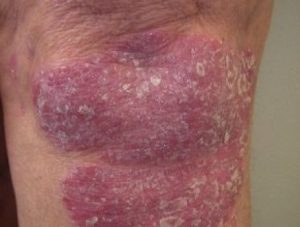Psoriasis

Psoriasis is a common chronic, immune mediated skin condition that causes red, thick, and scaly lesions on the skin as a result of inflammation. The red patches and scales that result from psoriasis are actually extra skin cells that have built up on the surface of the skin. You can develop psoriasis anywhere but it most often affects the scalp, elbows, knees, hands, trunk, and legs.
Types Of Psoriasis
There are many different types of psoriasis, each characterized by there own set of symptoms. Some of the more well known forms of psoriasis are:
- Plaque psoriasis – The most common form has red, scaly plaques with white or silvery scale on the skin. Plaques most frequently develop on the elbows and knees but are also commonly seen on the scalp, legs, and trunk. Nail involvement is common.
- Guttate psoriasis – This form of psoriasis characterized by numerous small red, scaly lesions on the body, especially the trunk and extremities. This form of psoriasis is often preceded by a streptococcal throat infection.
- Nail psoriasis – Psoriasis can causes changes in the nail including pitting of the nail, discoloration, thickening, loosening of the nail, and crumbling.
- Inverse psoriasis – Typically occurs as more moist, red scaly patches or plaques in the folds of the skin such as the groin, armpits, or under the breasts.
- Drug-induced psoriasis – Some medications have been shown to cause or worsen psoriasis including beta-blockers, lithium, terbinafine, calcium channel blockers, and lipid lowering agents.
- Pustular psoriasis –This form of psoriasis appears as raised, slightly tender red bumps full of pus. It can be localized to the hands and feet. Widespread, severe cases can be seen and are a medical emergency.
- Erythrodermic psoriasis – A severe form of psoriasis with widespread red, scaly, exfoliating patches of skin about the body. This form of psoriasis can be fatal as the severe inflammation and peeling disrupt the skin’s ability to regulate temperature and protect itself from infection.
- Psoriatic arthritis – Psoriasis can also affect the joints in about 15-30% of psoriasis patients. Psoriatic arthritis produces joint inflammation resulting in swelling and pain of the fingers, toes, hips, knees, and/ or spine.
Causes of Psoriasis
Scientists do not yet know the exact cause of psoriasis. Even though this is the case, it is known that psoriasis is linked with a problem with your immune system. The immune system in patients with psoriasis sends faulty signals to tell the skin to grow too quickly then these skin cells don’t shed, but build up in layers. It is not contagious. Genetics play a role in the development of this disorder.
Treatment
Currently, there is no cure available for psoriasis available today. However it is possible to manage your symptoms through several different treatment options. Depending on the severity of symptoms and involvement, we may prescribe topical creams, oral medications, or injectable medications called “biologics” for more severe symptoms. Some treatment options we offer, depending on the type of psoriasis, are able to result in 100% clear skin. Contact us today to have Dr. George help you customize a treatment plan that is right for you.
Do you suffer from Psoriasis?
If you have or think you might have psoraisis don’t wait. Effective treatment options are just one visit to your dermatologist away. Let Dr. George guide you on the path to clearer skin today.
